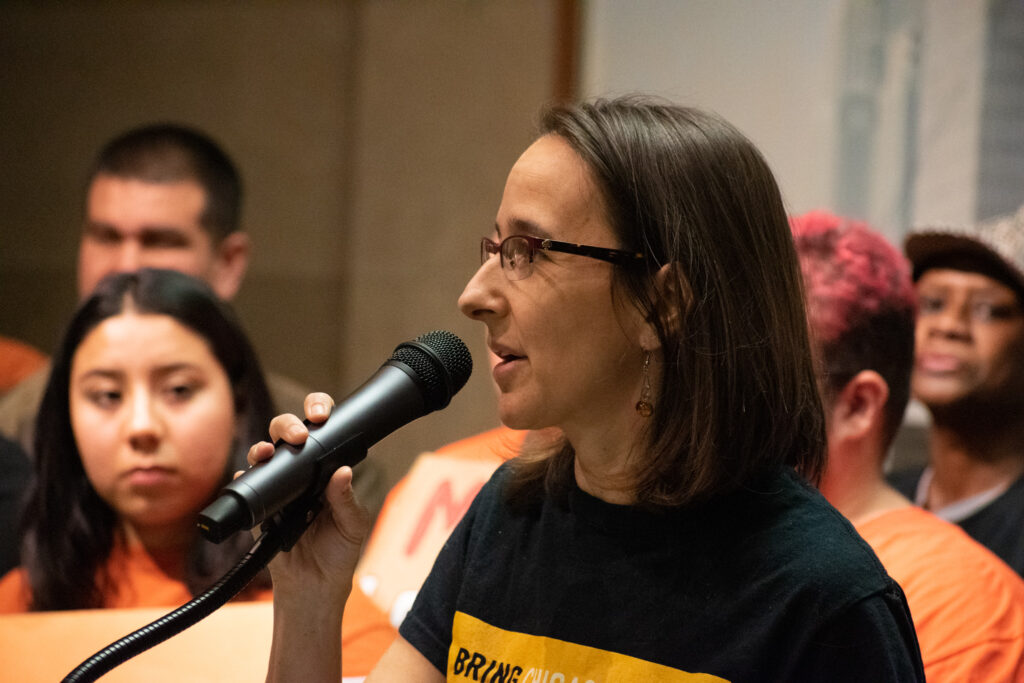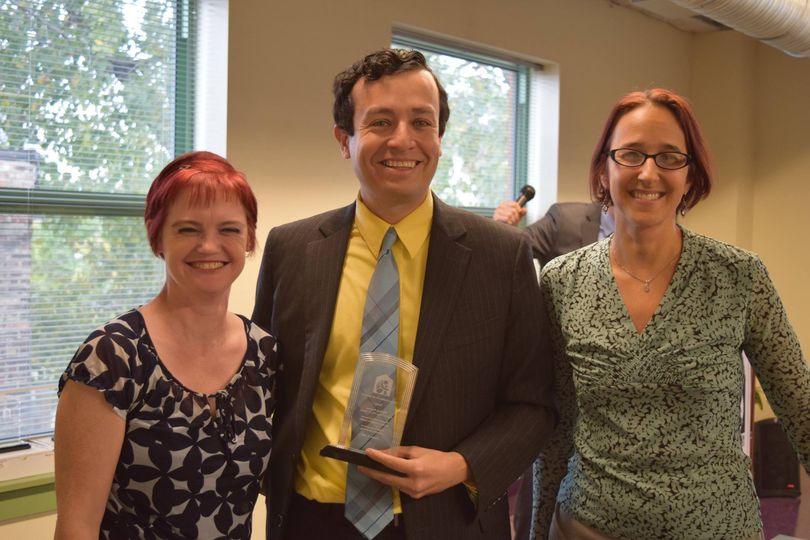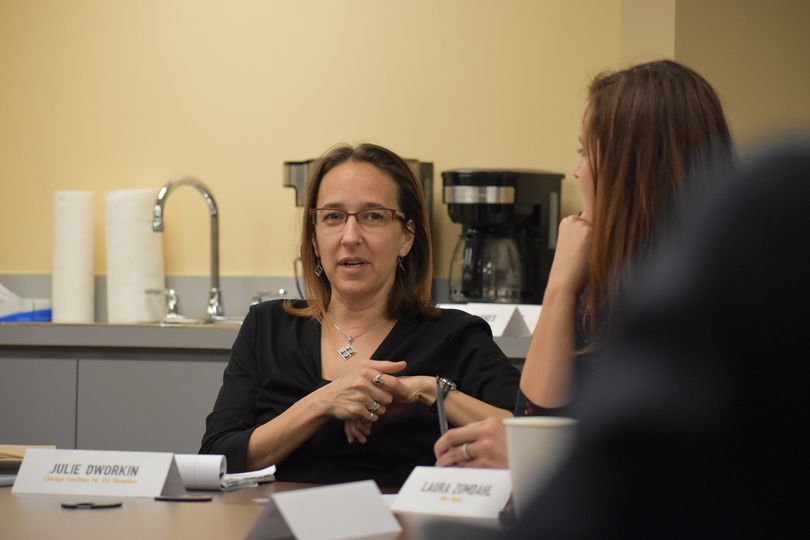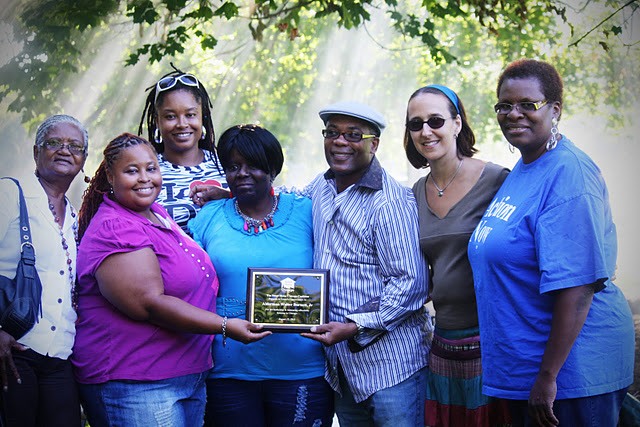By Sam Paler-Ponce and Mary Tarullo
Twenty-seven years at the same organization is an incredible achievement and Julie Dworkin, Director of Policy at Chicago Coalition for the Homeless, is understandably ready to take on new challenges. She has announced her last day will be November 3.
Julie is recognized locally and nationally as a committed and tireless advocate and policy expert. She stands out for her unwavering dedication and resilience. Her efforts have made a profound impact in addressing Chicago and Illinois homelessness and housing issues.
Over the years, Julie played both a contributing and leadership role in a wide range of important policy and budgetary changes at both the city and state level. Below is just a sampling of efforts that Julie lent her presence and voice to.
Affordable Housing and Homelessness Prevention
Family Homelessness Prevention Program
Julie’s advocacy efforts resulted in the creation of an Illinois program to help families facing homelessness. This program has helped over 110,000 households avoid homelessness, proving that Julie’s work has a lasting impact on the community.
Rental Housing Support Program
In 2005, Julie helped create a Rental Housing Support Program, designed and advocated by our housing campaign, It Takes a Home to Raise a Child. Rent support provides long-term affordable housing for families earning less than $20,000 a year. Rental subsidies are funded by a $10 surcharge on real estate recordings, creating a program that helps 2,400 Illinois families, including those helped through the Chicago Low-Income Housing Trust Fund. For more information, visit the IHDA Rental Housing Support Program.
Funding for Housing in the State’s Capital Budget
The third plank of the It Takes a Home to Raise a Child Campaign was increasing state funding for development of affordable housing. Working with other statewide and local partners, Julie helped win the victory of the first ever affordable housing funding in the state’s capital budget of $134 million. The funding helped create over 1500 units.
Chicago Low-Income Housing Trust Fund
For more than 15 years, Julie has been a relentless advocate for improving the Chicago Low-Income Housing Trust Fund. The Trust Fund was created by City Council ordinance in 1989 to provide rental assistance to residents most in need of affordable housing. Homeless-dedicated units have encountered various challenges, such as conditions and habitability concerns and policies that were not particularly favorable to tenants exiting homelessness. Her advocacy resulted in improved program rules and eventually relocation of the programs to agencies more suited to serving those experiencing homelessness.
SRO Preservation Ordinance
The Chicago For All Coalition celebrated the passage of the Single Room Occupancy (SRO) Preservation ordinance, a groundbreaking achievement. This ordinance mandates that owners of SRO buildings negotiate in good faith with buyers to preserve units as affordable housing. It also dedicates resources to preserve SRO housing and provides critical tenant protections. Julie’s role in developing and negotiating this ordinance was commendable.
TIF Fund Advocacy: Boosting Affordable Housing
Julie’s role in advocating for the allocation of $35 million in tax-increment financing for the TIF Purchase Rehab Program was a significant achievement. This program restores rental housing for low- and moderate-income households, making a positive impact on affordable housing in Chicago.
Cook County Land Bank: Restoring Vacant Properties
In 2012, Julie’s advocacy helped to create a Land Bank in Cook County and pushed the Cook County Land Bank to target resources towards affordable housing for low-income households. Her appointment to the bank’s board of directors shows her commitment to this cause.
Bring Chicago Home
The Bring Chicago Home plan seeks to reform the Real Estate Transfer Tax (RETT), a one-time fee on the transaction of real estate. The plan aims to lower the pre-existing 0.75% tax on properties valued under $1 million, while raising it marginally on properties valued over $1 million. Revenue generated would fund permanent housing solutions for thousands of Chicagoans.
Since Bring Chicago Home’s 2018 launch, more than 250 grassroots leaders have co-led the campaign on its Grassroots, Leadership, and Steering committees. Steering committee organizations include CCH, Chicago Teachers Union, Communities United, Jewish Council on Urban Affairs, Not Me We, ONE Northside, SEIU-HCII, and United Working Families. Julie was instrumental in establishing Bring Chicago Home, perhaps CCH’s largest campaign to-date.
Affordable Housing and Homelessness Prevention
Families in Transition
The HomeWorks campaign played a pivotal role in advocating for Chicago’s Airbnb ordinance to fund housing solutions. This legislation allocates a 4% surcharge to fund supportive services and housing for people experiencing homelessness. The subsequent creation of the Housing Support for CPS Families in Transition program in 2017, as proposed by HomeWorks, was a significant milestone. This program provides permanent supportive housing to families experiencing homelessness, including those who are doubled-up. As the first city-funded program serving doubled-up households, it’s a shining example of how advocacy can lead to practical solutions that make a real difference.
Homelessness Data Project
Federal child and youth programs recognize all forms of homelessness that children and youth might experience, characterizing doubling-up homelessness as youth “temporarily staying with others.” The U.S. Department of Housing and Urban Development (HUD) has a far more limited scope, shutting out millions of homeless children and their families nationwide from homeless assistance programs. Recognizing that school-age children are not the only individuals temporarily staying with others, Julie working with researchers at the Social Impact Research Center of Heartland Alliance developed a model to estimate the total scope of people in these temporary, unstable living situations. In 2020, the methodological approach was refined working with Vanderbilt University and was published in a housing policy academic journal.
Doubled-Up Units Inclusion in American Rescue Plan Spending
One significant change that Julie helped bring about is the inclusion of doubled-up units in Chicago’s plan for addressing homelessness. Despite facing challenges posed by HUD’s preferences, Julie’s advocacy has led to the allocation of supportive housing units for people living doubled-up due to economic hardship. This is a remarkable shift that will benefit many individuals who had previously fallen through the cracks.
Youth Homelessness
Statewide Homeless Youth Campaign
Early in her time at CCH, Julie organized homeless youth providers throughout the state to advocate for more funding for housing and shelter programs for youth experiencing homelessness. The campaign resulted in doubling the state budget for youth homelessness programs. She also helped support the passage of legislation that allowed minor youth to consent to housing in licensed programs and healthcare services.
Permanent Housing for Youth
Julie’s efforts helped lead to the allocation of state capital funds for a new facility in Humboldt Park to serve youth and families experiencing homelessness. This facility will provide shelter and housing for those in need. Advocating for more permanent housing options for unaccompanied youth in Illinois, Julie helped secure the funding to create a facility that will offer longer-term housing for homeless youth, addressing a critical need.
State Budget Advocacy
During the 2016 state budget impasse, Julie supported a public action outside one of Governor Bruce Rauner’s homes and at the Governor’s mansion in Springfield to draw attention to the impact of the budget impasse on homeless and housing services. At Rauner’s house, they used 25 symbolic backpacks to represent the 25,000 homeless children in Illinois, who often carry their entire lives in these bags. The state’s accumulated funds dedicated to affordable housing and ending homelessness reached a staggering $275 million. These dedicated funds can provide vital support without increasing the state budget deficit. The actions resulted in the release of the dedicated funds in a stop-gap budget bill.
Criminal Justice Reform
Chicago Housing Authority Re-Entry Pilot
In 2012, after advocating for many years to change CHA’s rules around background checks and who is admitted to housing, Julie and the Reentry Project Committee’s collaboration with the Chicago Housing Authority resulted in the proposal of a pilot program that offers a Reentry Provider Housing Certificate. This certificate allows individuals with criminal records to access housing without barriers based on their past, offering a second chance to those who have demonstrated commitment to reentry. Several years later state legislation was passed mandating that all of the state’s public housing authorities have a six month look-back period and consider mitigating circumstances. This codified the Re-Entry committee’s work with the CHA.
Julie Dworkin’s dedication has brought about significant and transformative changes. Her efforts, resilience, and advocacy have paved the way for long-lasting solutions to homelessness. Julie is a true champion, and her journey is an inspiring testament to the power of advocacy.

















 Chicago Coalition for the Homeless is now Chicago Coalition to end Homelessness (CCH).
Chicago Coalition for the Homeless is now Chicago Coalition to end Homelessness (CCH).